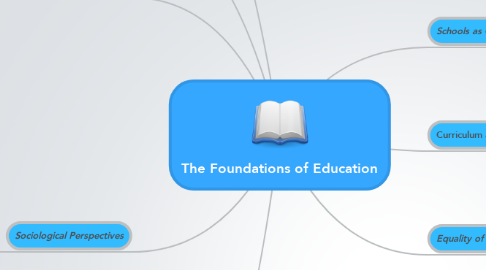The Foundations of Education
by Terry Smith


1. 4 purposes of Education: intellectual, political & civic, economic, and social purposes.
1.1. Intellectual: sparking intellectual curiosity in students
1.2. Political/Civic: schools shape the development of future generations of citizens and workers as well as an important source of jobs.
1.3. Economic: the role of economic education is to study economics issues relating to education.
1.4. Social: social studies is the integration of social science and humanities concepts for the purpose of practicing problem solving and decision making.
2. Politics of Education
2.1. 1. Schools are the foundation of solving socials issues.
3. The Philosophy of Education
3.1. Pragmatism: rejects the idea that the function of thought is to describe, represent, or mirror reality.
3.2. Existentialism: belief that philosophical thinking begins with the human subject. (the acting, feeling, living human individual.
3.3. Pragmatism is the viewed as the best philosophies of education, because it encourages problem-solving skills.
4. Schools as Organizations
4.1. 1
4.2. 2
4.3. 3
4.3.1. Included
4.3.2. Included
4.3.3. Excluded
5. History of U.S. Education
5.1. A major reform movement that spread worldwide was making education more available to more children. This movement was created by Horace Mann.
5.1.1. Project specifications
5.1.2. End User requirements
5.1.3. Action points sign-off
6. Sociological Perspectives
6.1. A theoretical perspective concerning the relationship between school and society is the assumption that education equips people to perform different functional roles in society. Functionalist believe this.
6.2. Functionalism: theory of the mind is philosophy developed largely as an alternative to both the identity theory of mind and behaviorism.
6.3. Conflict Theory: emphasizes the social, political, or material inequality of a social group that detract from structural functionalism and ideological conservatism.
6.4. Interactionism: derives social processes from human interaction. the study of how individuals act within society.
6.5. Five Effects of Schooling: preparing students for their future careers, instilling them with knowledge needed to live in the real world, teaching students problem-solving skills, teaching students how to make rational decisions, and teaching them to work in various environments and interacting with different people.
7. Curriculum and Pedagogy
7.1. 1
7.1.1. Materials
7.1.2. Personel
7.1.3. Services
7.1.4. Duration
7.2. 2
7.3. 3
8. Equality of Opportunity
8.1. 1
8.1.1. Dependencies
8.1.2. Milestones
8.2. 2
8.2.1. Schedule
8.2.2. Budget
8.3. 3
8.3.1. KPI's
